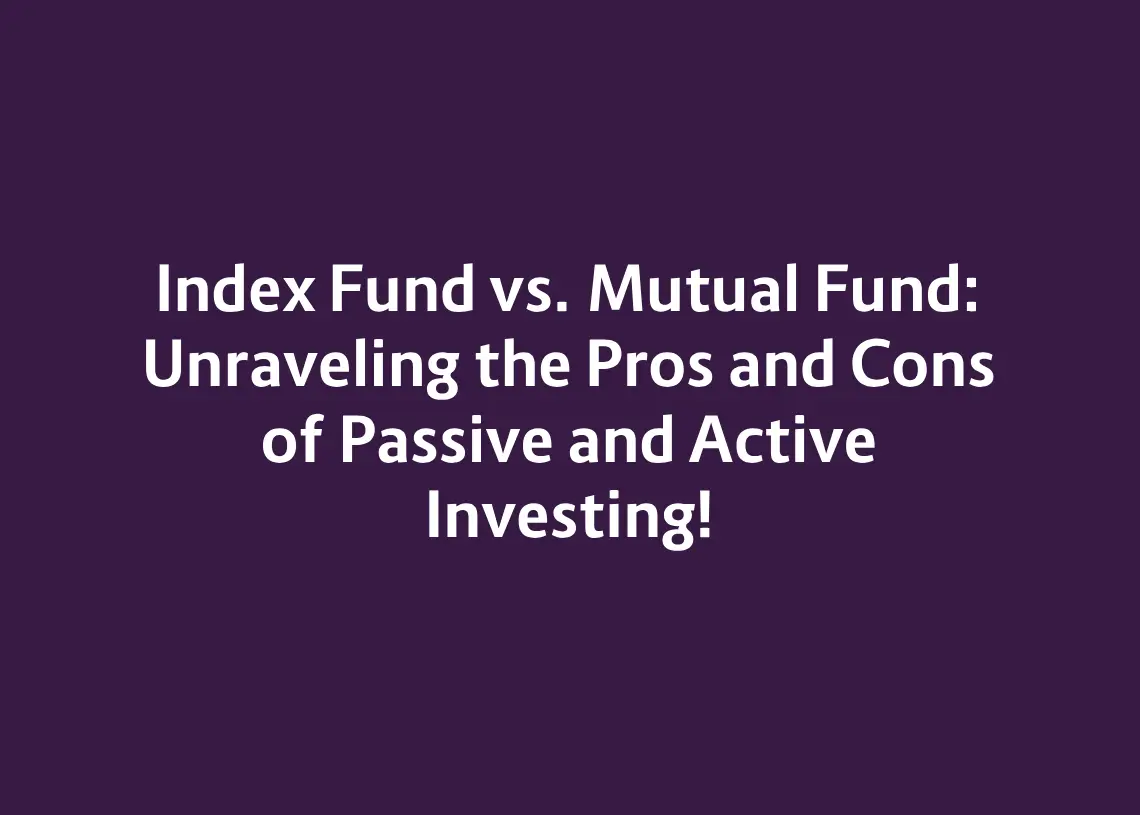Investing can be a great way to grow your wealth and secure your financial future, but with so many investment options available, it can be overwhelming to decide where to invest your money. Two popular investment choices are index funds and mutual funds.
While both offer a way to invest in a diversified portfolio, there are significant differences between the two. Index funds are a type of passive investment that tracks a specific market index, while mutual funds are actively managed by a team of professional fund managers who aim to outperform the market.
Choosing between index funds and mutual funds can be a challenging task, and it’s crucial to understand the pros and cons of each. With the rise of passive investing, index funds have become increasingly popular due to their low fees and simplicity. In comparison, mutual funds offer the potential for higher returns through active management, but also come with higher fees.
In this blog post, we’ll take a closer look at the differences between index funds and mutual funds and the pros and cons.
Definition of index funds
Index funds are a type of passive investment vehicle that track a specific market index, such as the S&P 500 or NASDAQ. They offer investors a low-cost and diversified way to invest in the market, as they aim to match the performance of the underlying index.
The goal of index funds is to replicate the performance of the overall market, rather than trying to outperform it. This approach generally results in lower fees and expenses compared to actively managed mutual funds, which have higher fees due to the need for professional fund managers to research, select, and monitor individual stocks. Index funds have gained popularity in recent years due to their simplicity, low costs, and historically strong performance. They are often considered a cornerstone of a passive investment strategy.
Definition of mutual funds
Mutual funds are a type of investment vehicle that pools together money from multiple investors and invests it in a diversified portfolio of stocks, bonds, or other assets. The fund is managed by a professional portfolio manager who uses their expertise to make investment decisions on behalf of the fund’s investors.
Mutual funds offer investors an opportunity to access a diversified investment portfolio without having to research and select individual securities themselves. The portfolio manager’s goal is to generate returns for the investors while managing risk.
Mutual funds charge fees known as expense ratios, which cover the cost of managing the fund. These fees can vary widely and can impact an investor’s overall returns. Mutual funds are regulated by the Securities and Exchange Commission (SEC) and must adhere to specific rules and guidelines.
Comparison of fees and expenses
When making investment decisions, it is important to consider the fees and expenses associated with each option. In the case of mutual funds, these fees can be relatively high due to the active management involved in selecting and trading securities.
This can result in higher management fees, as well as sales charges, redemption fees, and other expenses. On the other hand, index funds are generally passive investment vehicles that seek to match the performance of a particular market index.
As a result, their fees are typically lower than those of actively managed mutual funds, as there is less trading involved. It is important to carefully consider these fees and expenses when choosing between index funds and mutual funds, as they can significantly impact the overall return on your investment.
Active vs. passive management
Active vs. passive management is a critical consideration when deciding between an index fund or a mutual fund. It involves a portfolio manager who makes investment decisions based on their own research and analysis, with the aim of outperforming a benchmark index.
Passive management, on the other hand, aims to match the performance of a benchmark index by investing in the same securities as the index in a proportionate manner. While active management may seem attractive due to the potential for higher returns, it also comes with higher fees and the risk of underperformance.
Passive management, on the other hand, offers lower fees and a more predictable return, but may not deliver the same returns as active management in a bull market. Ultimately, the choice between active and passive management will depend on an investor’s individual investment goals and risk tolerance.
Historical performance differences
One of the key differences between index funds and mutual funds is their historical performance. Historically, index funds have outperformed most actively managed mutual funds, particularly over the long-term. This is due in part to the lower expenses associated with index funds, as well as the fact that actively managed mutual funds incur additional expenses related to research and analysis.
Over time, these expenses can eat into the returns generated by mutual funds, making it more difficult to achieve consistent performance. In contrast, index funds track the performance of a specific market index, such as the S&P 500, and aim to replicate its returns as closely as possible by investing in the same securities.
This can lead to more consistent and predictable returns over the long-term, particularly when compared to actively managed mutual funds. However, it’s important to note that past performance is not a guarantee of future results, and investors should always do their own research and consult with a financial advisor before making any investment decisions.
Diversification and risk management
When it comes to investing, diversification and risk management are two critical factors that can significantly impact your portfolio’s success. Index funds and mutual funds have different approaches to achieving these goals.
In an index fund, diversification is achieved by holding a wide range of securities that represent a particular index, such as the S&P 500. This approach reduces the risk of holding individual securities and ensures that you are invested in a diverse range of companies.
On the other hand, mutual funds are actively managed, and the fund manager uses their expertise to select securities that they believe will outperform the market. While this approach can potentially provide higher returns, it also comes with higher risk. By diversifying your investments across both index funds and mutual funds, you can achieve a balance between risk management and potential returns.
Flexibility and customization options
When it comes to investing, it’s important to consider the level of flexibility and customization options that are available to you. In the context of comparing index funds and mutual funds, it’s worth noting that index funds generally offer more flexibility in terms of investment options and customization.
Investors can choose from a range of index funds that track different market indexes, and can adjust their investments based on their personal preferences and risk tolerance. In contrast, mutual funds are managed by fund managers who make investment decisions on behalf of investors, which can limit the degree of customization available.
However, mutual funds may provide more flexibility in terms of investment strategies and the ability to seek out higher returns through active management. Ultimately, the level of flexibility and customization options that are most suitable for you will depend on your individual investment goals and preferences.
Tax efficiency considerations
When considering the differences between index funds and mutual funds, it is essential to evaluate the tax efficiency of each type of investment. Tax efficiency is a crucial consideration for any investor, as it directly impacts net returns.
Index funds have a reputation for being more tax-efficient than mutual funds due to their passive management style. This passive approach results in fewer trades and lower turnover, which leads to fewer taxable events. In contrast, mutual funds are more likely to generate capital gains due to their active management strategy, which involves frequent buying and selling of securities.
Additionally, mutual fund investors may be subject to capital gains taxes even if they do not sell their shares if the fund sells assets at a profit. It is important to carefully consider the tax implications of each type of investment before making a decision.
Investment goals and strategies
When it comes to investment goals and strategies, there are a number of factors that investors must consider in order to make informed decisions about where to allocate their funds. Some of the most important considerations include the investor’s risk tolerance, investment time horizon, and desired level of returns.
Additionally, investors must determine whether they prefer a more active or passive investment approach. Active investment strategies involve frequent buying and selling of securities in order to generate returns, while passive strategies involve buying and holding a diversified portfolio of assets in order to achieve market returns over the long term.
Ultimately, the decision between index funds and mutual funds will depend on an investor’s unique goals and preferences. It is important to carefully evaluate the pros and cons of each investment vehicle in order to make an informed decision that aligns with one’s investment objectives.
Choosing the right investment vehicle
When it comes to investing, choosing the right investment vehicle is crucial to achieving your financial goals. There are various options available, but one of the most common dilemmas investors face is choosing between index funds and mutual funds.
Both of these investment vehicles have their own pros and cons, and it’s crucial to understand them before making an informed decision. Index funds are known for their passive investment strategy, which tracks a benchmark index and aims to replicate its performance by investing in all the securities that make up the index.
On the other hand, mutual funds are actively managed by a fund manager, who selects and manages a portfolio of securities with the aim of outperforming the market. Understanding the differences between these two investment vehicles is essential to make an informed decision that aligns with your investment goals, risk tolerance, and investment time horizon.
Conclusion: Index Fund vs. Mutual Fund: Unraveling the Pros and Cons of Passive and Active Investing!
In conclusion, both index funds and mutual funds have their unique set of pros and cons, and the choice ultimately depends on individual preferences and investment goals. Index funds are ideal for those seeking a low-cost, diversified, and passive investment strategy, while mutual funds offer active management and the potential for higher returns but come with higher fees. As with any investment decision, it is essential to research and understand the options available and consult with a financial advisor to make an informed decision based on your individual circumstances.




